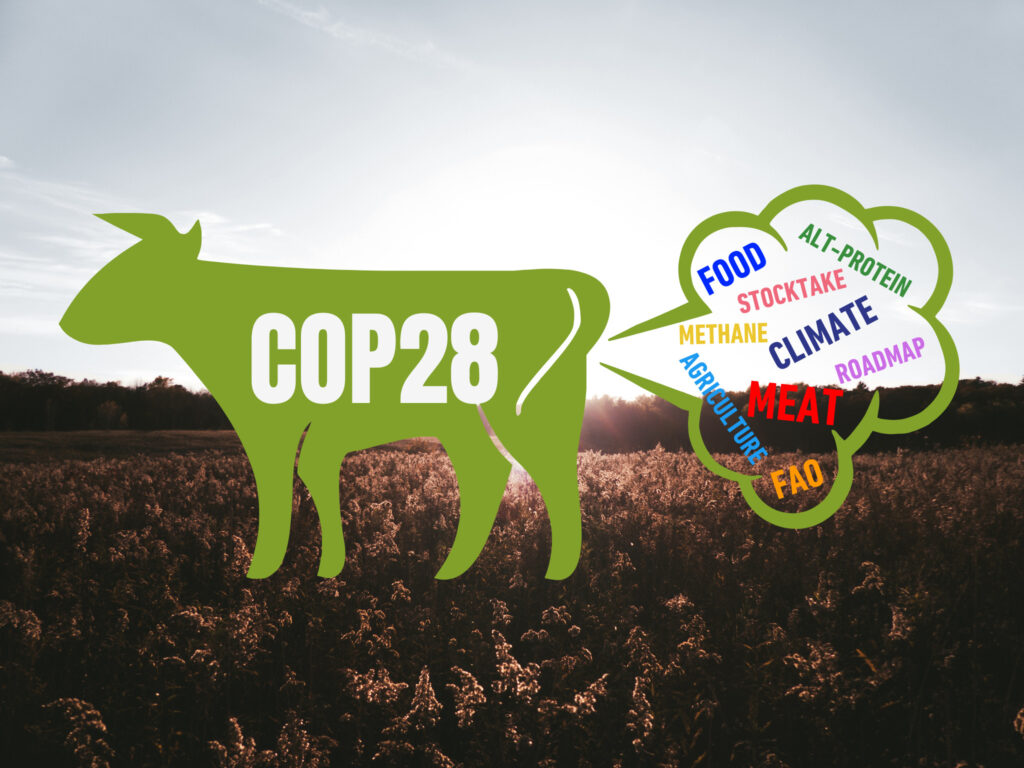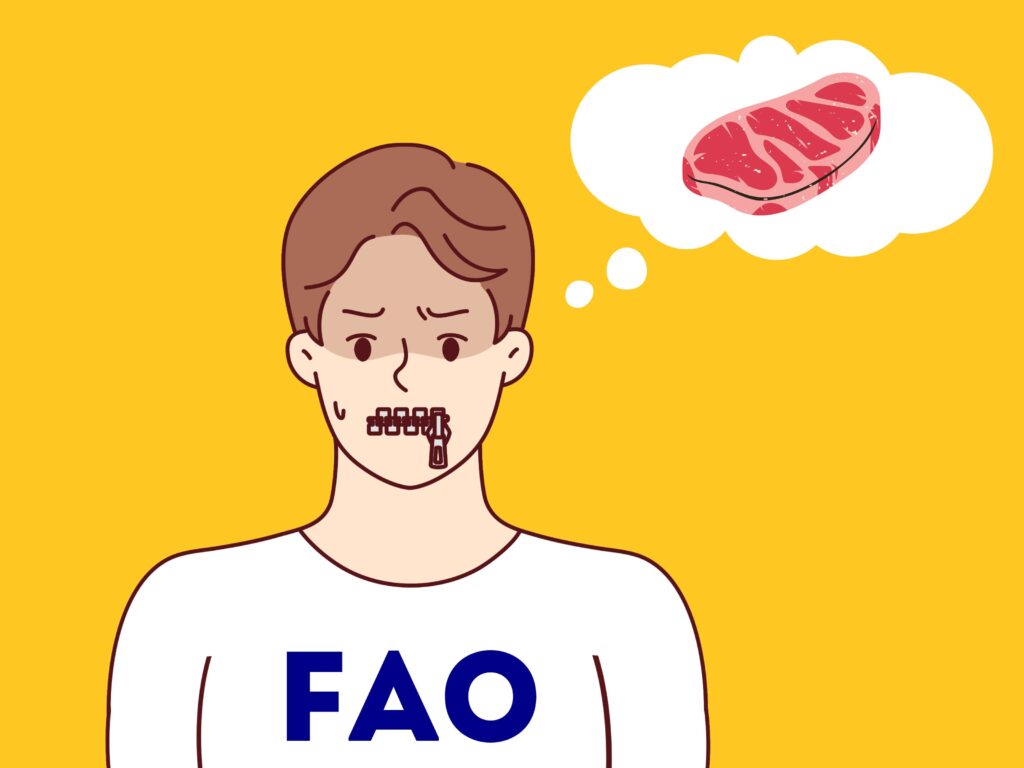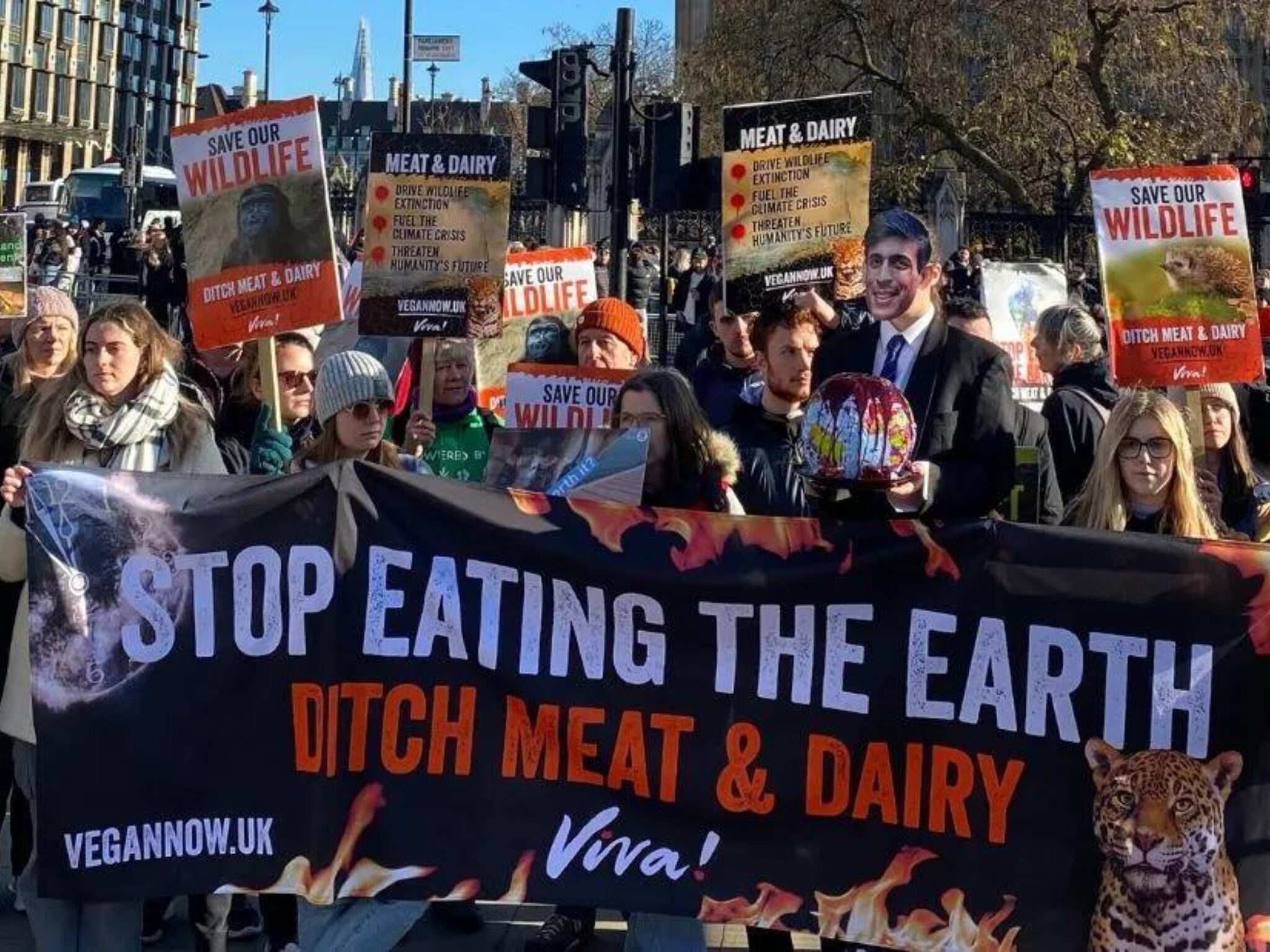6 Mins Read
As meat and dairy representatives turned out to COP28 in record numbers, the climate summit’s promised food systems transformation policies fell short – and the livestock lobby is delighted.
COP28 began with a lot of promises, but as is typical with most of these conferences, it didn’t really go full-tilt on any of them. Take the food system, for example. Last year’s summit was dubbed the food COP for its overdue prioritisation of the agricultural sector, with two-thirds of the food served being vegetarian or vegan, in a nod to the climate footprint of the livestock industry.
There was talk about a food systems transformation, rich people eating less meat, and mitigation measures – but the resulting text was lacking and vague, with not much real progress and no binding targets. The UN FAO didn’t say that meat and dairy consumption needs to be reduced, even though they account for the majority of the food system’s emissions. This is despite the UNEP producing a report endorsing alternative proteins as a viable and sustainable solution to animal agriculture during the conference itself.
But this shouldn’t really come as a surprise. The FAO has been in cahoots with the livestock sector for years – the latter has successfully lobbied over the years to water down the true impact of animal agriculture in the FAO’s reporting. And COP28 itself saw the number of meat and dairy lobbyists triple, just as smallholders and family farmers felt left out.
Now, the livestock industry is celebrating what it reckons is a positive outcome from the UN climate summit, with representatives sharing their enthusiasm and delight on a virtual panel just a week after the COP28 ended, as reported by DeSmog.
What meat and dairy lobbyists said about COP28

Hosted by trade publication Feedstuffs, the online discussion saw livestock lobby groups hail COP28 as a win, noting that there had been widespread recognition at the conference that agriculture was a “solution” to climate change. This is in spite of the sector being responsible for a third of global emissions, and livestock itself contributing to 11-19.6% of the total.
Constance Cullmann, president of US lobby group Animal Feed Industry Association, said the summit resulted in “a far more positive outcome than we had anticipated”, noting that it was the first time she’d “felt that optimistic” after a “large international gathering like this one”.
She was also pleased with the “strong recognition” at COP28 that meat and dairy “had a real role in meeting the nutritional needs of folks around the globe”. Cullmann labelled the FAO’s roadmap as “music to our ears”, welcoming its emphasis on “production and efficiency” over “looking at reduced consumption of animal protein”.
Representing the US Pork Board, Jamie Burr said he was “excited to see” that the FAO recognised efficiency as the best pathway to reduce emissions, describing US agriculture as the “most efficient in the world”. Eric Mittenthal, who was at the panel on behalf of the Meat Institute, talked about the importance of sharing the message that livestock farming is necessary for nutrition and sustainability. He added that the lobby group – which represents the likes of JBS, Cargill and Tyson, among others – has demonstrated how agriculture can be a “solution” for “healthy people and a healthy planet”.
The panellists also discussed criticism of their industry and the need to keep up positive messaging. Mittenthal suggested that COP28 attendees were “not representing the science or the reality on the ground”, which is why the industry’s presence at the conference was crucial. He added that collaboration is key as “groups opposed to animal agriculture will come back stronger”, and partnering with NGOs could help the sector “be taken seriously”.
Cullmann, meanwhile, said that the sector had got “breathing room” with the summit, but added that “this is a marathon for us”. “We need to jump into that and make sure that we don’t take the pressure off of communicating the incredible work that’s been done for decades and continues to be done,” she said about the year ahead. “The short answer is: not take the foot off the gas pedal – we’ve got to keep pushing.”
Addressing COP28’s failure to deliver its food promises

Despite hopes of faster action to transform the food system, climate experts said COP28’s declarations and reports were well short of what’s required. On the second day, 130 countries signed a declaration on sustainable food systems, but Lim Li Ching, co-chair of the International Panel of Experts on Food Systems, criticised the text for its “vague language” and pointed out the lack of any mention of “reducing overconsumption of industrially produced meat”.
The FAO’s roadmap, which was initially expected to advise rich countries to eat less meat, did not make any such explicit recommendations, only proposing a 25% reduction in livestock methane emissions by 2030. In fact, it actually promoted the increase of aquaculture by 75%, and said meat production needs to be increased in lower-income countries to address health challenges.
“The Global Roadmap has been developed with reference to and based on existing scientific and peer-reviewed publications. In no stage of the development of the Roadmap were livestock industries consulted, or any inputs were received from them,” the FAO told DeSmog.
Then there was the Global Stocktake, where agriculture was only mentioned in terms of adaptation to climate change, not mitigation. “Action on food systems transformation is still dangerously ignored,” Emile Frison, senior advisor to the Agroecology Coalition, told DeSmog.
Last month, experts and academics from five universities criticised the FAO’s failure to recommend a cut in meat consumption in a letter published in the Nature journal. “By failing to recognize the need to reduce the production and consumption of animal-sourced foods, the FAO misses a central element of a climate-friendly food system,” said lead author Cleo Verkuijl, who is a researcher at the Stockholm Environment Institute. “It’s like publishing a 1.5°C roadmap for the energy sector that ignores the need to scale back fossil fuels.”
Around the same time, a survey of 210 climate and food scientists showed that they agreed meat and dairy production needs to be significantly reduced, and quickly. The experts said livestock emissions must peak by next year, and be slashed by 60% by the end of the decade. And 92% of experts said reducing livestock emissions is key to limiting temperature rises to 2°C, while 85% stated that it’s important for human diets to shift from “livestock-derived foods to livestock replacement foods”.
In response, the FAO told DeSmog: “We believe that some comments on the change in diets and the role of animal products in them are either misinformed because people have not properly read the roadmap report, or deliberately disingenuous for the sake of feeding vested interests narratives.”
But it’s hard to shake that narrative off when you consider the FAO’s relationship with the livestock lobby, and the latter’s effects on the former’s policy recommendations and emissions reporting. No wonder the meat and dairy executives are delighted, though. Meanwhile, we continue to head towards a world where the food system takes up half of our carbon budget by 2050.



